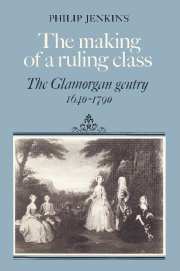Book contents
- Front matter
- Contents
- List of maps and tables
- Acknowledgments
- Abbreviations
- General introduction
- PART I SOCIAL AND ECONOMIC STRUCTURE
- PART II LOCAL AND NATIONAL POLITICS
- PART III SOCIETY AND CULTURE
- Introduction
- 7 The idea of a gentleman
- 8 Education and culture
- 9 The spread of metropolitan standards
- Conclusion to Part III: ‘conspicuous antiquity’
- Aftermath: towards the Victorian world
- Conclusion: from Civil War to Industrial Revolution
- Appendix 1 Parliamentary service by Glamorgan landowners 1640 – 1800
- Appendix 2 The ‘secondary’ gentry families
- Appendix 3 The ‘tertiary’ families
- Appendix 4 The Mansell family and their connections with the greater gentry
- Appendix 5 The roundhead and puritan family links of the Thomases of Wenvoe
- Notes
- Index
9 - The spread of metropolitan standards
Published online by Cambridge University Press: 22 September 2009
- Front matter
- Contents
- List of maps and tables
- Acknowledgments
- Abbreviations
- General introduction
- PART I SOCIAL AND ECONOMIC STRUCTURE
- PART II LOCAL AND NATIONAL POLITICS
- PART III SOCIETY AND CULTURE
- Introduction
- 7 The idea of a gentleman
- 8 Education and culture
- 9 The spread of metropolitan standards
- Conclusion to Part III: ‘conspicuous antiquity’
- Aftermath: towards the Victorian world
- Conclusion: from Civil War to Industrial Revolution
- Appendix 1 Parliamentary service by Glamorgan landowners 1640 – 1800
- Appendix 2 The ‘secondary’ gentry families
- Appendix 3 The ‘tertiary’ families
- Appendix 4 The Mansell family and their connections with the greater gentry
- Appendix 5 The roundhead and puritan family links of the Thomases of Wenvoe
- Notes
- Index
Summary
Introduction
Perspectives were changing rapidly – social, geographical, intellectual. Changes no less profound also took place in the gentry's everyday life, their manners and their standards of domestic comfort; and it was London that provided the ultimate model in each case. The country gentry had long placed a high value on their firm independence from the metropolis, from the aristocratic corruption associated with the Court, and the sordid money-making of the City. But in the eighteenth century it was precisely the Court and the City which were so influential in spreading to the province's new values of ‘politeness’ in language, literature and forms of entertainment. As the gentry were the political masters of the shire, it was to be expected that they should have come into contact with the Court periodically, and tried to emulate its manners. More curious is the tremendous influence in this period of the way of life of the professional and commercial classes, especially those of London, who seemed so far removed from landed society in their attitudes and commonplaces.
From the later seventeenth century, such ‘middle-class’ views were expressed in a vigorous and popular literature and art, the market for which had only recently been created by new economic forces. Expanded trade, notably in the colonies, greatly enriched the commercial classes, and helped create a larger and wealthier home market among ‘middling’ groups, who could now afford more consumer goods, and a higher level of domestic comfort.
- Type
- Chapter
- Information
- The Making of a Ruling ClassThe Glamorgan Gentry 1640–1790, pp. 239 - 271Publisher: Cambridge University PressPrint publication year: 1983



